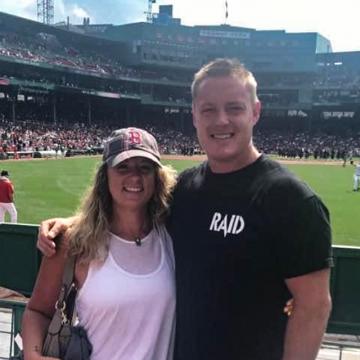Tell us about your decision to join the Marine Corps.

I was studying political science back in March of 2003. I had a lot of opinions about the upcoming war in Iraq. I remember watching the “shock and awe” of the invasion of Baghdad, and it felt odd that war had become a spectator sport. When I graduated in 2005, I believed that the most direct way for me to have any kind of positive impact in Iraq was to go over. I knew that at least I could be accountable for my own conduct overseas and possibly be a force for good. So, I enlisted in the Marines and was in Ar Ramadi, Iraq, less than a year later.
Tell us about your career from Marines to attending Simmons.
I was deployed to Iraq and Afghanistan with the Marine Corps Infantry. I saw combat in both theatres. After I got out, I went back to the only trade I had ever worked in and roofed for the next seven years. I struggled with many of the issues that a lot of veterans leaving the military struggle with. I went to the VA for help and spent two years letting some very intelligent and empathic people give me advice, and then I followed that advice.

When I felt I was in a place where I could start to give back after having been given so much, I went back to school. Along with my girlfriend, I'm active in several adaptive sports programs that make skiing, kayaking, basketball, and softball accessible to people of all abilities. We are both instructors for AmpSurf, an organization that takes people of all abilities surfing. I also work at the Mass Bay Veterans Center, which is a transitional residence for veterans experiencing homelessness.
What inspired you to pursue a Master of Social Work (MSW)?
VA social workers changed my life. I would not be at Simmons if it weren’t for their patience and help. My girlfriend and I are both veterans and have lives we never thought were possible because of the VA and their staff. I’m now studying to be a social worker, and she is studying to be a certified therapeutic recreation specialist. Together, we hope to have long careers working with people who struggle with substance use, mental health issues, and a variety of accessibility issues to live lives filled with purpose, growth, and joy.
VA social workers changed my life. I would not be at Simmons if it weren’t for their patience and help.
How has it been transitioning into life as a student again?
Any transition in life can be difficult. But, with each new challenge or responsibility I take on comes either a victory or a valuable learning experience — either way, I become a better person.
What's your favorite part of the Master of Social Work (MSW) program?
I’ve loved working at my placements. I’ve met some incredible people and even got a job out of my first-year internship. This year, I managed to get a placement working with the VA in the Veterans Affairs Supportive Housing (VASH) program. I have had some great teachers and gotten a chance to dig deeper into therapies and skills that I was introduced to as a client.
I’ve had a chance to meet people from different cultures and backgrounds, and they’re all at Simmons for the same reason: they want to help people. I have a group of students (who I now consider friends) with whom I have taken several courses, and we support and encourage each other. I wouldn’t have made it this far without them, and I hope I have been able to support them as well.
I’ve had a chance to meet people from different cultures and backgrounds, and they’re all at Simmons for the same reason: they want to help people.
What does Veterans Day mean to you?
I’m not sure exactly what it means to me. I know how I feel on Veterans Day. I usually feel some pride and sadness all at the same time. I guess I think about war on Veterans Day, and war is complex. It would be nice if one side were the good side and the other the bad side, but that is never the case. So, it’s kind of a mixed bag for me.
I think about the friends I made, the friends I lost, their families, and I think about the people in Afghanistan and Iraq whose lives will never be the same. Every Veterans Day, Memorial Day, and Mother's Day, I call three mothers who will never talk to their sons again — and then I wonder what the point of it all was.
Have you been able to translate lessons from the military into your academics?

I think one thing I got out of the military was the value of teamwork. I think that has helped me with group projects because if I say I’m going to do something, I usually do it.
Another way my time in the military has helped me with school work is by putting things into perspective. I get nervous presenting or doing role plays. Sometimes I’m able to remind myself that if I screw up, no one will die. I may get a little embarrassed and do something wrong, but it’s not a matter of life or death.

